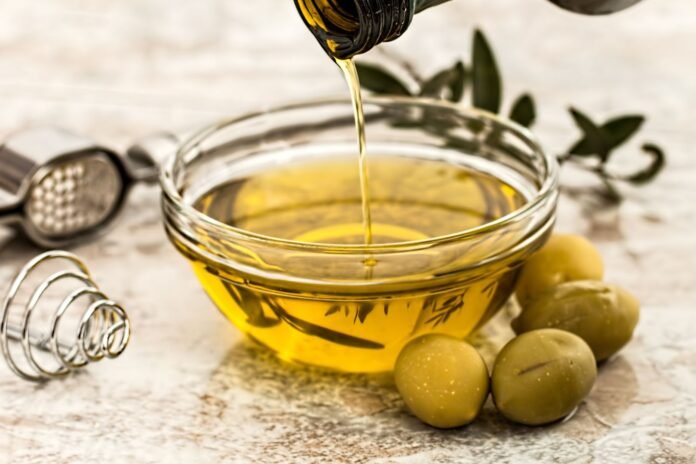Medically reviewed by Aviv Joshua, MS
Olive oil, a cornerstone of the Mediterranean diet, is celebrated for its rich concentration of healthy fats, antioxidants, and anti-inflammatory compounds. With its myriad health benefits, olive oil is often deemed one of the healthiest dietary fats, making it an excellent choice for promoting overall wellness.
How Olive Oil Is Made
The process of making olive oil begins by crushing fresh olives into a paste. This paste is stirred to release the oil, and the mixture is then separated in a centrifuge to extract the olive oil from water and pulp. High-quality olive oil, such as extra virgin olive oil, is minimally processed to retain its natural flavor, aroma, and beneficial compounds.
Common Uses of Olive Oil
Olive oil is incredibly versatile, used for everything from salad dressings to sautéing vegetables. It’s also a popular ingredient in cosmetics, such as skincare and haircare products.
Health Benefits of Olive Oil
Protects Against Heart Disease
Studies reveal that consuming more than half a tablespoon of olive oil daily can lower the risk of coronary heart disease by 18%. Rich in monounsaturated fats like oleic acid, olive oil helps reduce LDL (“bad”) cholesterol while boosting HDL (“good”) cholesterol. Its antioxidant content also combats inflammation and protects against atherosclerosis (hardening of the arteries).
May Help Prevent Strokes
By lowering blood pressure and cholesterol, olive oil may reduce stroke risk. Research shows that consuming 1.5 to 2.2 tablespoons daily is beneficial for heart health, though even smaller amounts may offer protection.
Supports Brain Health and May Fight Alzheimer’s Disease
Extra virgin olive oil contains phenolic compounds that may help prevent Alzheimer’s by reducing harmful beta-amyloid plaques in the brain. These compounds also combat inflammation and oxidative stress, protecting brain health.
May Reduce Type 2 Diabetes Risk
Olive oil’s healthy fats and phenolic compounds improve blood sugar control and reduce the risk of type 2 diabetes. Extra virgin olive oil, in particular, has been shown to enhance insulin sensitivity.
Lowers Cancer Risk
Mediterranean populations’ lower cancer rates are partly attributed to their high olive oil consumption. Antioxidants in olive oil, such as hydroxytyrosol, protect cells from damage, reducing the risk of several cancers, including breast, gastrointestinal, and urinary tract cancers.
Helps Manage Rheumatoid Arthritis
Research suggests that olive oil may reduce inflammation and symptoms in rheumatoid arthritis (RA) patients. Topical application of extra virgin olive oil has also shown promise in alleviating joint pain.
Improves Gut Health and Helps With IBD
Olive oil supports a healthy gut microbiome and reduces inflammation, benefiting conditions like Crohn’s disease and ulcerative colitis. It may also alleviate symptoms like bloating, constipation, and bowel urgency.
May Boost Mental Health
A study found that daily consumption of olive oil improved symptoms of severe depression. Its role in the Mediterranean diet, rich in polyphenols, has also been linked to better mental health outcomes.
Fights Harmful Bacteria
Olive oil’s polyphenols may inhibit harmful bacteria like Helicobacter pylori, which is linked to stomach ulcers. Early research also suggests it may combat foodborne pathogens such as E. coli and Salmonella.
Nutrition Facts
One tablespoon of olive oil contains:
- Calories: 124
- Fat: 14 g
- Vitamin E: 2 mg
- Vitamin K: 8.43 mcg
While olive oil is calorie-dense, it’s rich in healthy fats and antioxidants, particularly vitamin E and small amounts of vitamin K, which are vital for immune health, red blood cell formation, and bone health.
Choosing Between Regular and Extra Virgin Olive Oil
Extra virgin olive oil is the least processed variety, retaining more antioxidants and nutrients compared to refined olive oils. Its robust, fruity flavor makes it a favorite in research studies and culinary uses alike.
How Much Olive Oil Should You Consume?
Studies suggest consuming at least half a tablespoon of olive oil daily for health benefits. However, moderation is key due to its high calorie content.
Final Thoughts
Olive oil is a powerhouse of nutrients and health-promoting compounds. From reducing the risk of chronic diseases like heart disease, diabetes, and Alzheimer’s to enhancing mental and gut health, it’s an indispensable part of a healthy diet. For maximum benefits, opt for extra virgin olive oil and enjoy it as part of a balanced, Mediterranean-inspired diet.
Disclaimer: This article is for informational purposes only. Always consult a healthcare professional for personalized advice.



